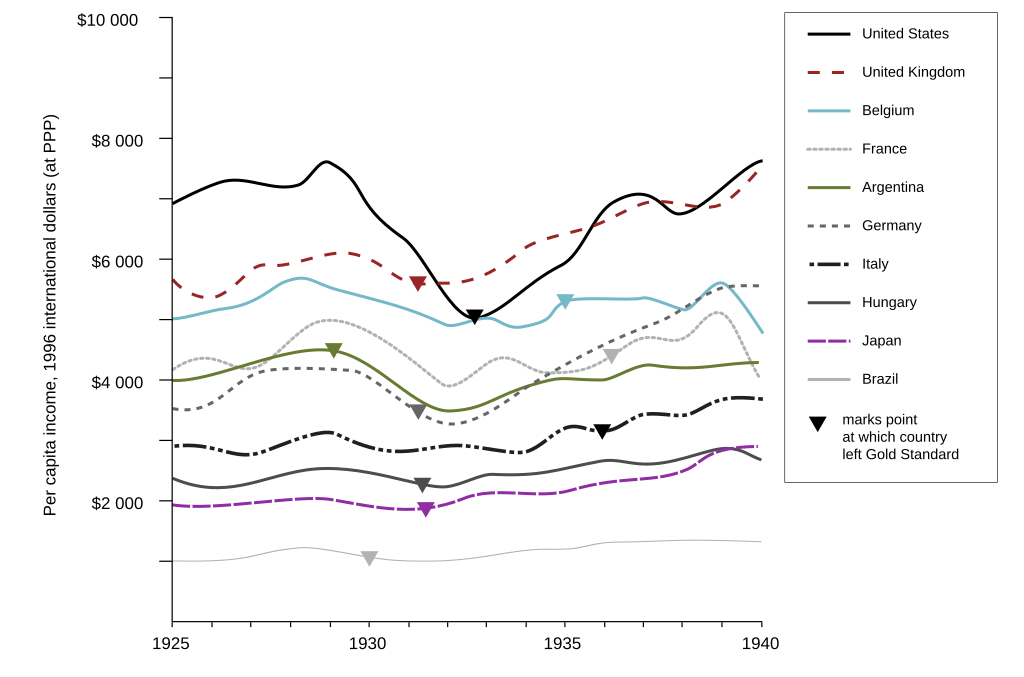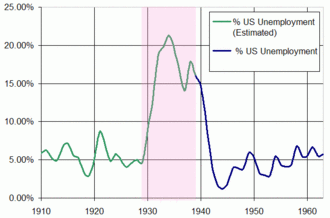Because you are surrounded by other countries with bigger, better armies, especially France, who just recently conquered you.
You'll have to point out at which period France invaded and occupied and then dissolved the German government, turning the entire territory that constituted Germany and all her people into a conquered nation.
Second, both Britain and France had by the 1930s expressed their desire to have Germany return to the common market to the point that they even suspended payments of reparations.
Yet I've shown you that Jewish emigration accounted for more loss of foreign reserves that the Reichsbank even held. You can't just ignore that.
And you can't ignore this only became a problem
after the institution of financial and economic policies that led to the need for the foreign currency reserves in the first place.
I'm far better off as a German worker where I'm guaranteed work and a paycheck, I have the KdF providing cheap vacations, I get subsidies for starting and raising my family, etc.
What was the American experience?
Comprehensive financial reform that didn't destroy the mainstay of the of the American economy and then required the mass persecution of an entire segment of the population in order to steal money from private savings in order to finance military expenditures.
Plus, and we cannot ignore this fact, Germany did that with everyone working.
Except for the people who just weren't counted on the employment rolls. Funny how you keep leaving that out.
Because basically all you're doing is grasping at a handful of statistics and arguing that's all the information you need and then ignoring everything else. A healthy German economy doesn't require the government to steal money from retirement funds and local governments, which the Reich did. Good economic policies don't force the government to ban private construction, institute wages restrictions and price controls, ban people from carrying currency outside the country, or force banks to buy bonds under threat of retribution. Good economic policies don't undermine the foundation of the national economy and cause a currency crisis, but there are all things that happened and you want me to ignore them in favor of your narrative.
The reality is by 1938 the Reich was spiraling towards financial disaster.
"As the Reichsbank put it: ‘The currency must now underpin not an expansive power politics, but a policy of peaceful construction. Historically we have before us the same task of conversion as Frederick the Great after the Seven Years War, Prime Minister Peel after the Napoleonic War and Mussolini after the war in Abyssinia. The main task is to manage the transition from the current war economy to a peacetime economy.’ This transition would not be painless or free of risk. But there was no alternative. Any further government spending financed by monetary expansion would simply add to the overhang of excessive purchasing power, which could only be contained by a further elaboration of the already cumbersome and unmanageable apparatus of surveillance and control. That, in turn, would result in a chronic deterioration in the standard of living, ‘the political and social consequence of which need not be further discussed’. ‘One should not therefore reinforce the dykes, but reduce the weight that is pressing against them.’ In doing so the Reichsbank knew that it had to proceed carefully. Though the inflationary spike could still be broken, this involved risks. An excessively sharp reduction in the volume of credit could easily turn the difficult transition into a disastrous ‘deflationary crisis’. Instead, the Reichsbank proposed to drain off excess purchasing power by issuing long-term bonds, enabling the Finance Ministry to consolidate its precarious budgetary situation. More importantly, however, there was an urgent need to ensure a rapid increase in the production of consumer goods. Only a supply of real goods to absorb at least some of the excess purchasing power could stem the inflationary threat. What the Reichsbank was calling for, in short, was a dramatic shift in priorities: a sharp reduction in ‘non-marketed output’ for the purposes of the state, which according to contemporary estimates accounted for 30 per cent of industrial production in 1938, in favour of the production of household consumer goods.4 A precondition, however, for all further action was the need to raise exports. The most serious threat to the German economy was the possibility of an acute balance of payments crisis. A sudden interruption of the import of essential raw materials and foodstuffs as in 1934 would be fatal for public confidence and might well jeopardize the delicate process of adjustment that the Reichsbank was trying to manage."
Tooze, Adam. The Wages of Destruction: The Making and Breaking of the Nazi Economy (pp. 286-287).


